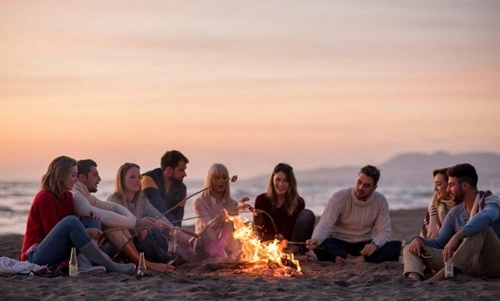Yes, in many cases, it is illegal to make a fire on the beach without a permit or in areas where beach fires are explicitly prohibited. Rules regarding beach fires vary widely depending on the location, local ordinances, and environmental regulations. While some beaches permit bonfires in designated areas or under specific conditions, others strictly ban them to protect the environment and ensure public safety.
Understanding the Legal Framework for Beach Fires
Beach fires are regulated to balance public enjoyment, environmental preservation, and safety. In the United States, these regulations are typically established by local municipalities, state parks, or federal agencies, depending on the jurisdiction of the beach.
1. Local and State Regulations
Permits and Designated Areas
- Permits Required: Many beaches require individuals to obtain a permit to have a fire. Permits often include guidelines for fire size, location, and cleanup.
- Designated Fire Rings: In popular beach destinations such as California, fire pits or rings are provided in specific areas to allow bonfires while minimizing environmental impact. For example:
- Santa Monica Beach: Fires are permitted only in designated fire rings.
- Miami Beach, Florida: Open fires are prohibited without special permits.
Prohibited Areas
Some beaches outright ban fires due to safety risks, environmental concerns, or to comply with local regulations. Examples include:
- Hawaii: Most beaches prohibit open fires to protect delicate ecosystems.
- Maine: Many coastal areas restrict fires to prevent wildfires and protect wildlife habitats.
2. Federal and Protected Areas
Beaches within national parks or wildlife refuges are subject to federal regulations.
- National Park Service Rules: Beach fires are often prohibited in national parks unless explicitly allowed in designated areas. For example, fires are permitted at Assateague Island National Seashore but only in designated fire rings.
- Environmental Protection: Protected areas often ban fires to safeguard wildlife, prevent pollution, and reduce the risk of spreading invasive species through firewood.
3. Reasons for Restrictions
Environmental Concerns
- Wildlife Protection: Fires can disturb nesting birds and other wildlife.
- Litter and Pollution: Ash, unburned wood, and trash from fires can harm marine life.
- Ecosystem Damage: High heat can damage beach vegetation and alter natural landscapes.
Public Safety
- Fire Hazards: Unattended or poorly managed fires can spread, especially in windy coastal conditions.
- Smoke and Visibility Issues: Smoke from beach fires can obscure visibility, posing risks to nearby roads or trails.
4. Penalties for Illegal Beach Fires
Violating beach fire regulations can lead to:
1. Fines: Penalties can range from $50 to $1,000, depending on the location and severity of the violation.
2. Eviction or Arrest: Individuals may be removed from the beach or face legal action for repeat offenses or non-compliance.
3. Environmental Restitution: In some cases, offenders may be required to pay for damages to the environment caused by illegal fires.
Best Practices for Safe and Legal Beach Fires
1. Check Local Rules: Always confirm regulations with local authorities or park officials before starting a fire.
2. Use Designated Fire Areas: Opt for fire pits or rings provided by beach authorities.
3. Bring Your Own Wood: Some beaches prohibit collecting driftwood to preserve natural habitats.
4. Extinguish Completely: Ensure the fire is fully extinguished with water before leaving.
Recent Legal Updates (2023-2024)
1. Increased Enforcement
States like California and Florida have increased enforcement against illegal beach fires due to rising concerns about wildfires and environmental degradation. More patrols and stricter fines have been introduced.
2. Enhanced Permit Systems
Some municipalities, such as San Diego, have launched online permit systems to streamline the process for obtaining beach fire permissions.
3. Public Awareness Campaigns
Organizations like the National Oceanic and Atmospheric Administration (NOAA) have rolled out educational programs about the environmental impact of beach fires and the importance of adhering to local rules.
FAQs About Making Fires on the Beach
Q1. Is it always illegal to make a fire on the beach?
Ans: No, some beaches allow fires in designated areas or with a permit, while others ban them entirely.
Q2. Do I need a permit for a beach fire?
Ans: In many locations, a permit is required. Check with local authorities for specific guidelines.
Q3. What happens if I make an illegal fire on the beach?
Ans: Penalties can include fines, eviction from the beach, or legal action, depending on the severity of the violation.
Q4. Can I bring my own firewood for a beach fire?
Ans: Yes, but some beaches prohibit collecting local driftwood to preserve the ecosystem. Always check local regulations.
Q5. Are there alternatives to beach fires?
Ans: Yes, portable propane fire pits or grills are allowed on some beaches as a safer and environmentally friendly option.


